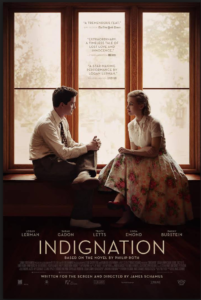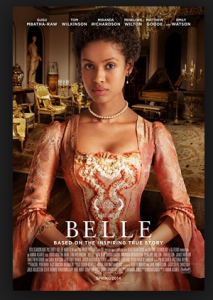August 17th, 2016 — 7:13am
***
 Indignation-sp
Indignation-sp
When we think of Philip Roth whose book this movie was based upon, we think of Jewishness, some kind of sex and guilt as vividly described in Roth’s best-selling book Portnoy’s Complaint and many other of his books. Sure enough these were the main ingredients of this film directed by James Schamus who also wrote the screenplay.
Marcus (Logan Lerman), a young man from New Jersey (as was Roth) is going away to a midsized college in Ohio (Roth went to Bucknell in Pennsylvania) in the 1950s as the Korean War was getting started. At the school, women have to be back in their dormitory at 9:00 p.m., Jewish students can belong to all Jewish fraternities and there are a certain number of required attendances which are expected at the weekly chapel services. Marcus, the main character, is Jewish and an atheist, a non-frat type of a guy with no real experience with the opposite sex. The story is vintage Roth and the audience where we saw the film seemed to be of an age which grew up reading Philip Roth as we did.
Marcus, who is inflamed with his ideals, neurotic as they may be and saddled with his hang-ups, grabs our attention as he encounters the authoritative Dean of students (Tracy Letts). The movie allows us to really get inside this young man’s head and feel his pain. It also is a period piece which recalls campus life in the 1950s at a time that our country was once again at war.
One major deficit of the movie is that we do not very well understand the young woman Olivia Hutton, (Sarah Gadon) who Marcus encounters at college. She obviously has some severe emotional conflicts but there is not enough expression of them or back story to satisfy the mental health professional part of us and therefore, much of this important character comes across as quite shallow. This takes away from the overall storyline and the experience of the movie. (2016)
Comment » | 3 Stars, Drama
June 22nd, 2014 — 5:24am
****
Belle-rm– This is a complicated film which deals with slavery, race relations in England in the latter part of the 18th century, women’s dependency on men, love, relationships, a tragic event at sea and an historic legal case. Yet in the end you come away with a sense of satisfaction, that things are working out for the best. The film is based on a true story written by Misa Sagay and Amma Asante who also directed this film and showed her sensitivity to the many issues covered in this story. The story revolves around Dido (Gugu Mbaatha-Raw), an illegitimate mixed race child of a Royal Navy admiral who brings his young daughter to be raised by his aristocratic uncle Lord Mansfield (Tom Wilkerson) and his wife Lady Mansfield (Emily Watson) while he goes off to sea. The Mansfields are also raising another child Elizabeth (Sarah Gadon) born to another member of the family who is not around. The two girls become very close as they grow to marriageable age. Great Uncle Mansfield also happens to be the Chief Justice of England who is about to rule on an important case concerned with the Zong Massacre. This involved a ship at sea that was transporting slaves from Africa and threw a number of them overboard to drown claiming they were out of drinking water and had to do this in order to survive and subsequently made a claim to their insurance company for their “lost cargo.†The story also shows the somewhat formal courtship of these now young women, the importance of the presence or absence of a dowry, and the view and treatment of women at this time and place. Of course the racial factor is also high lighted as there is this unique situation of a black girl being raised in the aristocratic home and now receiving a proposal of marriage from the men who come courting these women. There are tense moving interactions between the various characters as well a dramatic courtroom scene by Tom Wilkerson who we feel deserves special recognition among an outstanding cast. At the conclusion of the film we see a large completed oil painting of the two young women who are the centerpiece of the film and which was being painted earlier in the story. Then during the rolling of the credits we see another large painting of the actual women who are depicted in the story and are told where the real canvas is hanging. This reminder of the historical truth of all the themes shown in this film, makes it quite a memorable accomplishment.(2014)
Comment » | 4 Stars, Drama, History, Romance
 Indignation-sp
Indignation-sp



